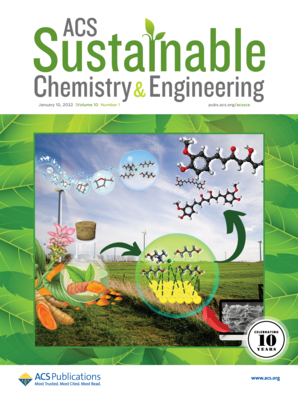用天然深共晶溶剂水热预处理从微藻中可持续回收脂质:分子设计、机制洞察和生命周期评估
IF 7.1
1区 化学
Q1 CHEMISTRY, MULTIDISCIPLINARY
引用次数: 0
摘要
本研究提出了一种利用天然深共晶溶剂(NADESs)作为水热预处理中合成深共晶溶剂(Syn-DESs)的绿色替代品,从湿微藻生产生物柴油的可持续策略。甜菜碱作为氢键受体(HBA),与7种有机酸配对作为氢键给体(HBDs),考察HBD结构(特别是碳链长度和官能团)对预处理过程的影响。结果表明,增加碳链长度可以增强蛋白质的增溶作用,但会限制生物质解聚,而不饱和键既能促进解聚作用,又能促进增溶作用,从而提高脂质收率。通过TGA和FTIR表征了预处理后微藻的结构变化,揭示了HBD结构通过影响NADES酸度和量子化学计算确定的分子极性指数,影响微藻的解聚和增溶。生命周期评估表明,虽然并非所有NADES的性能都优于synd - des,但甜菜碱-苹果酸NADES的净能量比(NER)为0.21 (synd - des为0.24),并且减少了15.36%的二氧化碳排放。此外,USEtox模型显示该NADES的生态毒性降低了2个数量级。这些发现强调了定制化NADESs在提高微藻生物柴油生产的可持续性和效率方面的潜力。本文章由计算机程序翻译,如有差异,请以英文原文为准。

Sustainable Lipid Recovery from Microalgae via Hydrothermal Pretreatment with Natural Deep Eutectic Solvents: Molecular Design, Mechanistic Insights, and Life Cycle Assessment
This study presents a sustainable strategy for biodiesel production from wet microalgae using natural deep eutectic solvents (NADESs) as green alternatives to synthetic deep eutectic solvents (Syn-DESs) in hydrothermal pretreatment. Betaine served as the hydrogen bond acceptor (HBA), paired with seven organic acids as hydrogen bond donors (HBDs), to examine the impact of the HBD structure (specifically carbon chain length and functional groups) on the pretreatment process. Results showed that increasing carbon chain length enhanced protein solubilization but could limit biomass depolymerization, whereas unsaturated bonds facilitated both depolymerization and solubilization, improving the lipid yield. Characterization of hydrochar by TGA and FTIR elucidated structural changes in pretreated microalgae, revealing that the HBD structure, through its influence on NADES acidity and molecular polarity index determined by quantum chemical calculations, affected both depolymerization and solubilization of microalgae. Life cycle assessment indicated that while not all NADES surpassed Syn-DES in performance, the betaine-malic acid NADES demonstrated a superior net energy ratio (NER) of 0.21 (compared to 0.24 for Syn-DES) and reduced CO2 emissions by 15.36%. Additionally, USEtox modeling showed a 2-order-of-magnitude reduction in ecotoxicity with this NADES. These findings underscore the potential of tailored NADESs to enhance the sustainability and efficiency of biodiesel production from microalgae.
求助全文
通过发布文献求助,成功后即可免费获取论文全文。
去求助
来源期刊

ACS Sustainable Chemistry & Engineering
CHEMISTRY, MULTIDISCIPLINARY-ENGINEERING, CHEMICAL
CiteScore
13.80
自引率
4.80%
发文量
1470
审稿时长
1.7 months
期刊介绍:
ACS Sustainable Chemistry & Engineering is a prestigious weekly peer-reviewed scientific journal published by the American Chemical Society. Dedicated to advancing the principles of green chemistry and green engineering, it covers a wide array of research topics including green chemistry, green engineering, biomass, alternative energy, and life cycle assessment.
The journal welcomes submissions in various formats, including Letters, Articles, Features, and Perspectives (Reviews), that address the challenges of sustainability in the chemical enterprise and contribute to the advancement of sustainable practices. Join us in shaping the future of sustainable chemistry and engineering.
 求助内容:
求助内容: 应助结果提醒方式:
应助结果提醒方式:


